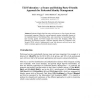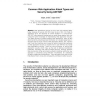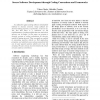41 search results - page 2 / 9 » Prevention of Cross-Site Scripting Attacks on Current Web Ap... |
ISW
2010
Springer
13 years 3 months ago
2010
Springer
Abstract. Instruction Set Randomization (ISR) is a promising technique for preventing code-injection attacks. In this paper we present a complete randomization framework for JavaSc...
BIOSIG
2008
13 years 6 months ago
2008
: Federated Single-Sign-On using web browsers as User Agents becomes increasingly important. However, current proposals require substantial changes in the implementation of the Rel...
CCS
2009
ACM
14 years 1 days ago
2009
ACM
We study the security of embedded web servers used in consumer electronic devices, such as security cameras and photo frames, and for IT infrastructure, such as wireless access po...
COMSIS
2006
13 years 5 months ago
2006
Web applications security is one of the most daunting tasks today, because of security shift from lower levels of ISO OSI model to application level, and because of current situati...
IEEEARES
2007
IEEE
13 years 11 months ago
2007
IEEE
It is difficult to apply existing software development methods to security concerns. Using software for security testing purposes, in particular, is hard to do. The fact that ther...



